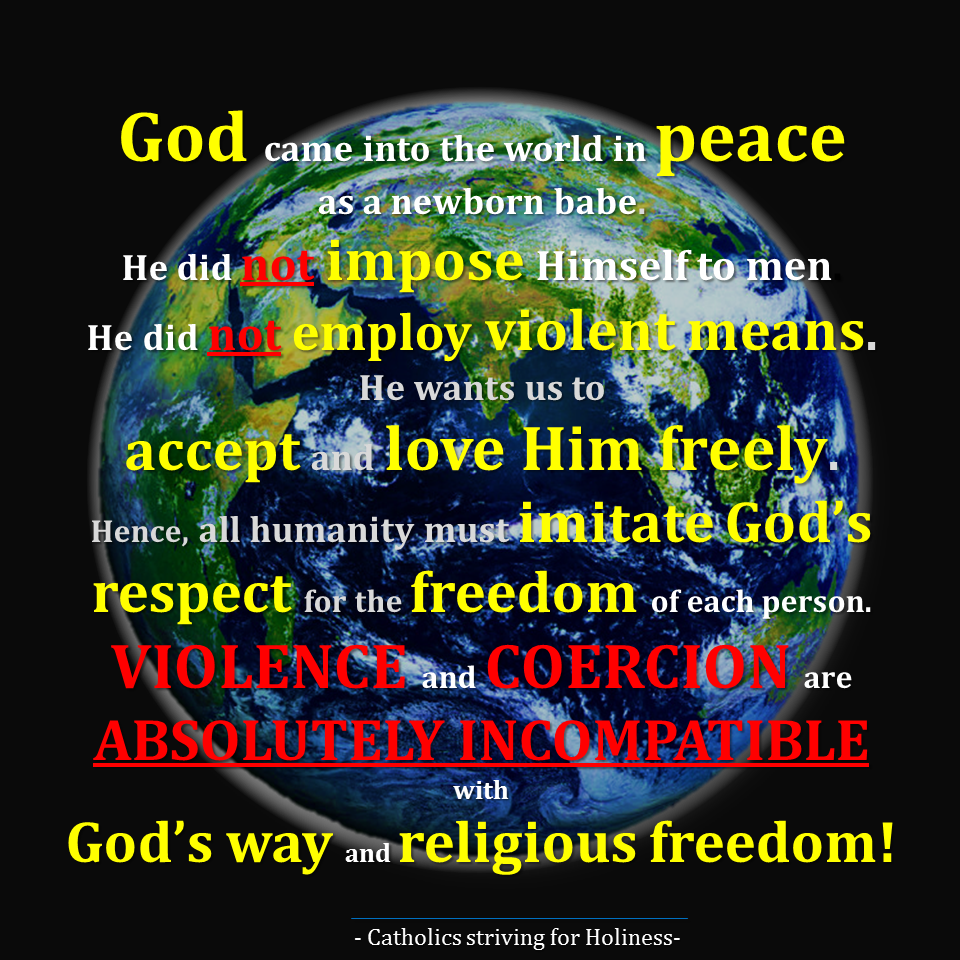
TEXTS TO CONSIDER:
1. Second Vatican Council, “Dignitas humanae, Declaration on Religious Freedom”
n. 2: “This Vatican Council declares that the human person has a right to religious freedom. This freedom means that all men are to be immune from coercion on the part of individuals or of social groups and of any human power, in such wise that no one is to be forced to act in a manner contrary to his own beliefs, whether privately or publicly, whether alone or in association with others, within due limits.
The council further declares that the right to religious freedom has its foundation in the very dignity of the human person as this dignity is known through the revealed word of God and by reason itself.(2) This right of the human person to religious freedom is to be recognized in the constitutional law whereby society is governed and thus it is to become a civil right.”
And no. 10: “It is one of the major tenets of Catholic doctrine that man’s response to God in faith must be free: no one therefore is to be forced to embrace the Christian faith against his own will.(8) This doctrine is contained in the word of God and it was constantly proclaimed by the Fathers of the Church.(7) The act of faith is of its very nature a free act. Man, redeemed by Christ the Savior and through Christ Jesus called to be God’s adopted son,(9) cannot give his adherence to God revealing Himself unless, under the drawing of the Father,(10) he offers to God the reasonable and free submission of faith. It is therefore completely in accord with the nature of faith that in matters religious every manner of coercion on the part of men should be excluded. In consequence, the principle of religious freedom makes no small contribution to the creation of an environment in which men can without hindrance.”
2. CATECHISM OF THE CATHOLIC CHURCH NN. 2106-2109:
2106 “Nobody may be forced to act against his convictions, nor is anyone to be restrained from acting in accordance with his conscience in religious matters in private or in public, alone or in association with others, within due limits.”34 This right is based on the very nature of the human person, whose dignity enables him freely to assent to the divine truth which transcends the temporal order. For this reason it “continues to exist even in those who do not live up to their obligation of seeking the truth and adhering to it.”35
2107 “If because of the circumstances of a particular people special civil recognition is given to one religious community in the constitutional organization of a state, the right of all citizens and religious communities to religious freedom must be recognized and respected as well.”36
2108 The right to religious liberty is neither a moral license to adhere to error, nor a supposed right to error,37 but rather a natural right of the human person to civil liberty, i.e., immunity, within just limits, from external constraint in religious matters by political authorities. This natural right ought to be acknowledged in the juridical order of society in such a way that it constitutes a civil right.38
2109 The right to religious liberty can of itself be neither unlimited nor limited only by a “public order” conceived in a positivist or naturalist manner.39 The “due limits” which are inherent in it must be determined for each social situation by political prudence, according to the requirements of the common good, and ratified by the civil authority in accordance with “legal principles which are in conformity with the objective moral order.”40